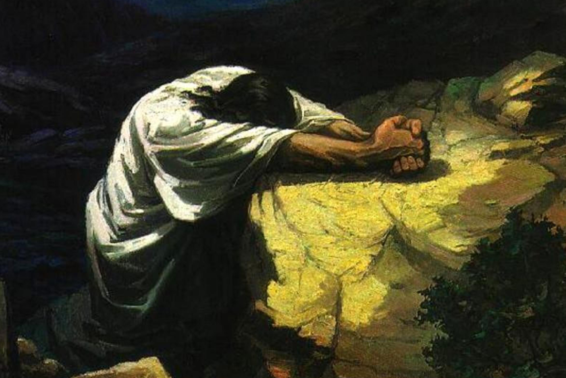
They went to a place called Gethsemane; and he said to his disciples, “Sit here while I pray.” He took with him Peter and James and John, and began to be distressed and agitated. And he said to them, “I am deeply grieved, even to death; remain here, and keep awake.” And going a little farther, he threw himself on the ground and prayed that, if it were possible, the hour might pass from him. He said, “Abba, Father, for you all things are possible; remove this cup from me; yet, not what I want, but what you want.” —Mark
The Gospels of Matthew, Mark, and Luke all describe Jesus’ agony in the garden of Gethsemane. The Gospel of John— unique in many ways—mentions only that Jesus “went out with his disciples across the Kidron valley to a place where there was a garden, which he and his disciples entered” (18:1).
The Gospel of Mark, which is quoted here, is the oldest, and linguistically the most primitive, of the four gospels. It uses strong, graphic language to describe Jesus’ experience in the garden. Mark says that Jesus was “distressed and agitated.” The older Revised Standard Version translates these words as “greatly distressed and troubled.” The point, however, is that Mark has no doubt about how human Jesus’ anguish was as he anticipated the hours ahead of him.
The Gospel of Matthew, not as old as Mark’s gospel and probably a little older than the Gospel of Luke, says that, in the garden of Gethsemane, Jesus “began to be grieved and agitated.” Then Jesus speaks for himself, saying, “I am deeply grieved, even to death.”
Luke’s passion narrative parallels those of Mark and Matthew and also includes elements that are both divine and uniquely human:
Then he withdrew from them about a stone’s throw, knelt down, and prayed, “Father, if you are willing, remove this cup from me; yet, not my will but yours be done.” Then an angel from heaven appeared to him and gave him strength. In his anguish he prayed more earnestly, and his sweat became like great drops of blood falling down on the ground. (Luke 22:41-44)
For his own theological reasons, Luke remarks that Jesus was strengthened by an angel—perhaps to make more graphic for his readers the divine presence at this terrible hour. Then, Luke describes Jesus’ suffering in a unique and particularly graphic way, saying that Jesus’ “sweat became like great drops of blood.” There is no question, then, that in the opinion of these three gospel writers, Jesus’ experience in the garden was one of intense, painful anguish.
For those who pray the Rosary using the sorrowful mysteries, the model provided by Jesus here illustrates the need, in the midst of anxiety, stress, and fear, to abandon oneself to God, our loving Father. We do well in such circumstances to tell him clearly what we want, as Jesus did, and then abandon ourselves to his care, making the words of Jesus our own: “Not what I want, but what you want.”
This is a selection from the Revised and Updated Edition of The Rosary Handbook: A Guide for Newcomers, Old-Timers, and Those In Between by Mitch Finley (The Word Among Us Press, 2017). Available at wau.org/books









